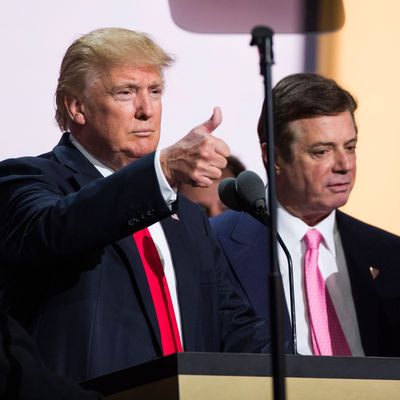
UPDATE: After this article was published, multiple reports on Friday confirmed that Paul Manafort agreed to cooperate in the Russia investigation, which would call for an end to a joint defense agreement between his lawyers and others representing Trump and his allies.
Since joining the president’s criminal defense team, Rudy Giuliani has proven he is worth his weight in gold. Not to Donald Trump, whose interests he’s undermined at every turn, but to the public and the press, which have gained a wealth of insights into the legal brain trust, if one can call it that, fighting back against Special Counsel Robert Mueller. The former mayor’s latest disclosure is that Paul Manafort, Trump’s onetime campaign chairman and now convicted felon, remains in a joint defense agreement with the Russia investigation’s worst antagonist: Trump himself.
“From our perspective, we want him to do the right thing for himself,” Giuliani told Politico about Manafort, sounding concerned for someone who was let go from the campaign the moment his unreported lobbying work for pro-Russian forces in Ukraine came to light. “There’s no fear that Paul Manafort would cooperate against the president because there’s nothing to cooperate about and we long ago evaluated him as an honorable man.”
This was not the note the Trump campaign sounded in the wake of Manafort’s ouster, and it’s far from clear how the White House will react to news Friday that the president’s former campaign chief has decided to give up a trial and plead guilty to conspiracy and obstruction charges. What remains clear is that things changed once the Mueller investigation got rolling and just about everyone in the president’s circle, including the president himself, lawyered up. The tone became more conciliatory between Trump and Manafort, and even as the latter came under increasing pressure from Mueller — indictments in Virginia and Washington, restrictive bail conditions, mounting legal bills — there was never any public indication that the longtime Republican operative would buckle.
The joint defense agreement explains why.
In the criminal defense world, there is nothing untoward or immoral about lawyers for targets and subjects of complex criminal investigations pooling resources and sharing their notes. There’s power in numbers, and joint defense agreements are a perfectly acceptable, if not preferable, way for lawyers to navigate a complex criminal investigation and not do double work, and for their clients to get their stories straight and feel as if they’re not alone in this. Big government is coming after them, after all, its resources are limitless, and a coherent defense strategy makes perfect sense.
We saw a joint defense agreement in action when Michael Flynn, Trump’s disgraced former national security adviser, decided to plead guilty and cooperate with prosecutors. Before he did so, he stopped sharing information with other lawyers in Trump world — in effect pulling out of the agreement. That’s reasonable: His lawyers determined his interests in cooperating and pleading guilty to a lesser charge — and not seeing the inside of a prison cell for a very long time — conflicted with everyone else’s interests. And so the deal was off.
But that was early in the probe. And Flynn appears to still be cooperating. What isn’t normal — and very little is in the Trump era — is for someone like Manafort to have an indirect lifeline, through his lawyers, to the president of the United States.
In his Washington case alone, which was set for trial next week, the lobbyist faced three superseding indictments charging him with a litany of offenses related to his foreign lobbying work, plus the loss of his liberty over allegations that he’s tampering with witnesses, which in turn led to additional charges that he conspired to obstruct justice — in concert with a suspected Russian intelligence agent at that. Needless to say, Manafort’s defense team is already privy to a lot of the goods the special counsel has on its client, and a new criminal information filed Friday in this same case shows the depths of his troubles. A guilty plea without a cooperation agreement doesn’t change that.
Why does any of this matter? Trump never tires of calling the Mueller probe a witch hunt, but if there’s a witch who knows one of the biggest secrets of the investigation — what exactly came of the Trump Tower meeting and whether Trump was in on it — it is Paul Manafort. The only way for Giuliani to be so sure that there’s nothing to fear about Manafort flipping on the president is to be sure about Manafort’s next steps — or else to have knowledge that Trump has dangled a pardon in front of him to keep him quiet.
The way you would be sure of something like that is through a joint defense agreement, which, again, is par for the course in any large-scale white-collar investigation such as Mueller’s. Just not one where one party to the agreement has the power to make it all go away. ‘There’s nothing normal going on here,” a source with knowledge of one aspect of the Mueller investigation told me. “He’s holding firm. Either Manafort is the most loyal human ever or he’s got the wink.”
Prosecutors aren’t big fans of joint defense agreements, but they understand they’re part of the game. Now that Manafort has decided to plead guilty and avert a second trial, the only question left is whether Mueller has anything up his sleeve to one-up him. Because trial or not, Manafort’s only saving grace is the president: Manafort’s convictions carry enough weight to keep him in prison for the rest of his days.





























